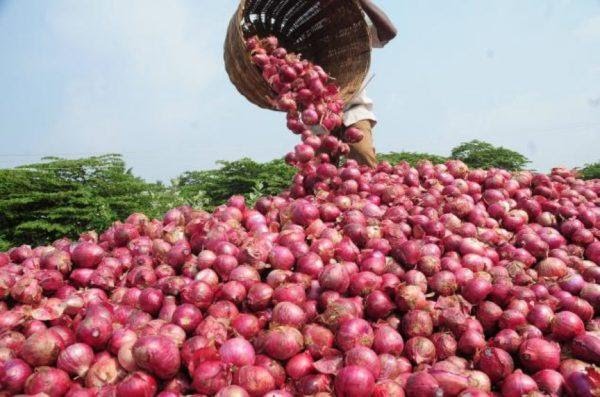ECONOMY
Nigeria yet to meet national demand of 2.44m metric tonnes onion

Nigeria is yet to meet her national demand 2.44 million metric tonnes onion production and currently contribute little to the export market.
The Permanent Secretary of the Ministry of Agriculture and Rural Development, Dr Ernest Afolabi-Umakhihe, represented by a Director in the ministry, Mrs Omotosho Marvelous, made this known in Birnin Kebbi on Friday at a workshop on adoption of good post harvest handling and Improved storage techniques for Onion production in Nigeria.
“Nigeria is among major producers of onions in the world, recently ranked 2nd in Africa and 7th in the world.
“Inspite of this potential, Nigeria is yet to meet her national demand 2.44 million metric tonnes and currently contribute little to the export market.
“This is largely due to inadequate knowledge and skills in onion production resulting in high post harvest losses, poor yield and produce quality, among others,” she said.
“Over 40 per cent of onions were lost at post harvest and storage levels.
“Though there is slight increase in the national output from 1.4 million metric tonnes in 2018 to 1.52 million metric tonnes in 2020, about 622,084 metric tones were recorded as post harvest losses with only 895,195 metric tonnes being utilised.
“The demand gap is 1.54 million metric tonnes amidst explosive population growth to be bridged by importation of onions and onion products such as onion powder, oil, among others, valued at 3.22 million dollars in 2020 which exerts enormous pressure on our foreign exchange earnings,” she said.
Afolabi-Umakhihe said the training is aimed at continuing upgrading knowledge and technical know-how of elite farmers, relevant desk officers, among others, to reduce post harvest losses and increase onion shelf-life.
“The training of elite farmers, relevant desk officers and detention staff, subject matter specialists on coordinated agricultural innovation approach required, will enable you to guide other farmers in best storage protocol to achieve sustainable agricultural production for food sufficiency and global export market,” she said.
Afolabi-Umakhihe urged the trainees to take advantage of the opportunity in order to acquire the needed knowledge and skills for onward cascading to other farmers in the state.
Earlier, a Director Federal Ministry of Agriculture, Alhaji Shehu Abdullahi, said that the priority of the present administration was the state of a nation’s agricultural development at any time that could be assessed as a result of use of unlimited improved agricultural technologies to satisfy its goals and objectives.
He called on the trainees to take advantage of their presence and interactive with them to build their capacity and knowledge base.
Abdullahi commended the efforts of horticulture value chain for organising the event adding that it would have a positive impact in order to reduce post-harvest losses and increase farmers returns on investment.
“It is my sincere hope that this training workshop will be given the seriousness and diligent it deserves. You are, therefore, encouraged to disseminate every knowledge gathered here to other colleagues who were not privileged to attend,” he urged.
Speaking on behalf of the participants, the Secretary of the National Onion Producers, Processors and Marketers Association of Nigeria (NOPPMAN), Shuaibu Isah, thanked the ministry and the federal government for organising the training for them and assured that they would utilize what they were thought for the purpose it was meant to achieve.




























 Davido's Net Worth & Lifestyle
Davido's Net Worth & Lifestyle 
